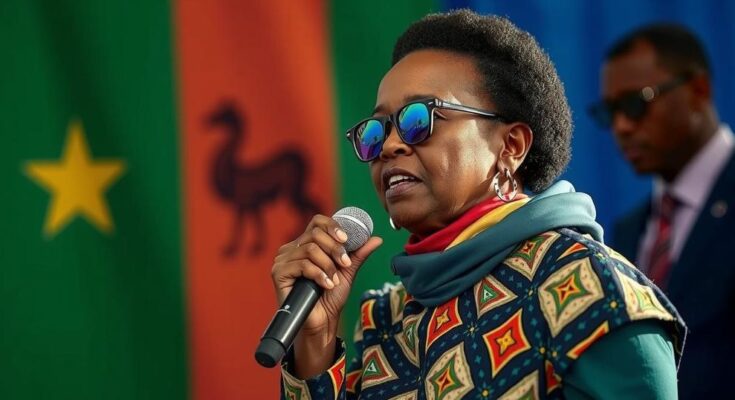Namibia’s upcoming presidential election may result in the country’s first female president, Netumbo Nandi-Ndaitwah, who is aiming to engage younger voters and address high unemployment rates. With SWAPO facing challenges in recent elections, all eyes are on the electoral engagement of diverse demographics as historical political dynamics shift in southern Africa.
Namibia approaches a pivotal moment in its political history as Vice President Netumbo Nandi-Ndaitwah stands as a contender for the country’s inaugural female presidency in the upcoming election. Approximately 1.4 million citizens have registered to vote amidst a competitive field of 15 political parties, including Nandi-Ndaitwah’s own, the South West Africa People’s Organization (SWAPO). Early polling results from Namibians abroad indicate SWAPO and Nandi-Ndaitwah hold a favorable position going into the election, despite the challenges the party faced in 2019 when it lost its two-thirds majority amid corruption allegations within its ranks.
Political analysts highlight the need for SWAPO to engage younger voters who may not resonate with its historical legacy. Henning Melber, a noted professor, emphasizes the urgency for the party to evolve: “The process of erosion of legitimacy as a former liberation movement has advanced too much.” Nandi-Ndaitwah aims to address critical issues such as the high unemployment rate among the youth, promising a substantial investment to create jobs. Furthermore, women’s rights issues are anticipated to significantly influence voter preferences.
Should she succeed, Nandi-Ndaitwah would join the ranks of pioneering women leaders on the continent. Erika Thomas, a political science lecturer, underscores the importance of transparency and policy reform during her potential tenure: “She must also try to push for policies and legislation frameworks for women’s participation and to bring more women into the political structures.”
The elections are set against a backdrop of remarkable changes within southern Africa’s political sphere, with significant losses for historical parties across the region. Nandi-Ndaitwah’s candidacy thus not only represents an opportunity for female leadership in Namibia but also envisions a renewed political engagement for a diverse electorate.
The political landscape in Namibia is on the brink of transformation as the nation approaches its presidential elections, with Vice President Netumbo Nandi-Ndaitwah potentially making history as the first female president since independence in 1990. Following discontent over past electoral integrity and corruption issues, SWAPO’s hold on power is being contested as its legacy faces scrutiny from an evolving electorate. At this crossroads, the engagement of younger voters and proactive policies will play a crucial role in defining the future of Namibia’s governance.
In conclusion, the upcoming presidential election in Namibia presents a significant opportunity for Vice President Netumbo Nandi-Ndaitwah to potentially become the country’s first female president. With a challenging political backdrop and pressures to address the concerns of younger voters and women’s rights, her election could signify a new chapter in Namibia’s democratic journey. As the electoral competition intensifies, adherence to transparency and accountability will be critical for the future leadership.
Original Source: abcnews.go.com




